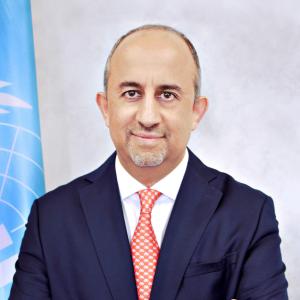Op-ed: Disability Inclusion is a key area of cooperation between the UN and Bahrain
04 December 2023
By the United Nations Resident Coordinator in Bahrain Khaled El Mekwad
Today, around 15 per cent of the world’s population, which is more than 1 billion people, live with a form of disability. Women with disabilities are recognized to be multiply disadvantaged, experiencing exclusion on account of their gender and their disability. These are just a few facts to keep in mind as we mark the International Day of Persons with Disabilities on December 3rd.
Against the backdrop of 2030 Sustainable Development Agenda’s promise to leave no one behind, the UN Secretary General’s report on Disability Inclusion in the UN system noted that “persons with disabilities continue to be among those who are most excluded, including in gaining access to education, health services and employment and in participating in political decision-making”. During the global Covid-19 crisis, people with disabilities have been among the hardest hit. Around the world, the socioeconomic repercussions of the pandemic are deepening pre-existing inequalities, including those associated with disability. This backdrop makes efforts to address persistent vulnerabilities around disability all the timelier.
In 2019, the UN Secretary General launched the UN Disability Inclusion Strategy to achieve transformative and lasting change on disability inclusion. Through the strategy, the organizations of the UN system reaffirm that the full and complete realization of the human rights of all people with disabilities are an inalienable, integral and indivisible part of all human rights and fundamental freedoms, in alignment with the Sustainable Development Agenda 2030.
Bahrain was one of the first countries to sign the UN Convention on the Rights of Persons with Disabilities in 2007 (acceded in 2011). Under the guidance of the High Commission for Disability Affairs, a range of government ministries and entities partnered with institutions and civil society organizations throughout Bahrain to address the needs of people with disabilities.
Even before signing the convention, Bahrain paid considerable attention to the issue of disability inclusion, issuing legislation, laws and decisions designed to protect the rights of people with disabilities. One such law (No. 74, 2006) provided many important guarantees for people with disabilities in the areas of care, rehabilitation and employment, and instituted a monthly disability allowance.
The UN and Bahrain have a long-standing partnership in the area of disability inclusion. UN agencies have supported the government in formulating an inclusive and integrated National Strategy for Persons with Disabilities (2012-2016). This included key pillars, such as legislation, health and rehabilitation, inclusive education, economic empowerment, social empowerment (including empowerment of women with disabilities), ease of access to facilities and services and awareness-raising and the media.
With the government having launched in 2023 the Action Plan of the National Strategy for the Rights of Persons with Disabilities (2022-2026), UN agencies are coming together to support the government in its implementation. In addition, the UN Country Team in Bahrain includes persons with disabilities, contributing their expertise to a range of programmes and projects geared towards the 2030 Agenda.
As we mark International Day of Persons with Disabilities, the UN looks forward to continuing to work hand in hand with the government and the people of Bahrain towards a more inclusive, accessible and sustainable world.

Prior to the UN, he pursued an extensive Diplomatic career in his national capacity for 19 years where he served as Alternate Representative at the Permanent Mission of Egypt to the UN in Vienna, Deputy Chief of Mission at the Embassy of Egypt in Dakar, and Political Officer at the Mission of Egypt to the EU in Brussels.
He obtained two post-graduate Diplomas in International Relations from the National School of Administration in Paris and the Institute for Diplomatic Studies of the Egyptian Ministry of Foreign Affairs in Cairo. Mr El Mekwad also holds a Bachelor’s degree in Engineering from Cairo University. In addition to Arabic, his mother tongue, he speaks fluent English & French.


